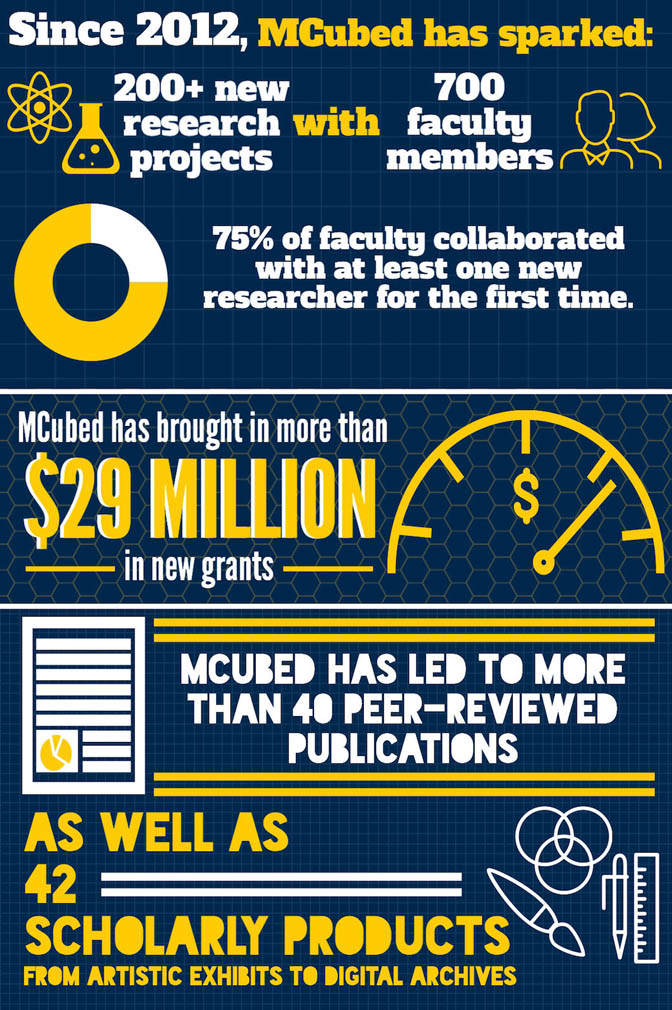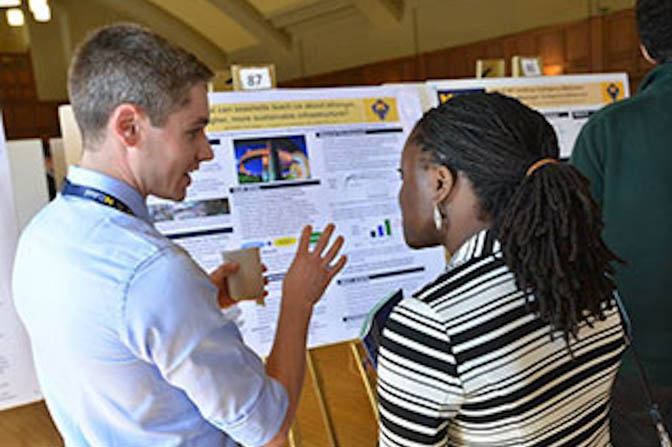U-Michigan’s unique MCubed seed grants start 2nd cycle
MCubed is a one-of-a-kind seed funding program designed to spark innovative research without traditional peer review.
MCubed is a one-of-a-kind seed funding program designed to spark innovative research without traditional peer review.
A doctor asked the overarching question of why kids die in the intensive care unit. It occurred to him there wasn’t a quick way to check their immune systems.
Today’s tests can take more than 24 hours. And if a child is suffering from sepsis—an overwhelming inflammatory response to infection—the wait could be deadly.
Through a University of Michigan program called MCubed, the pediatrician linked up with two mechanical engineering professors. MCubed is a one-of-a-kind seed funding program designed to spark innovative research without traditional peer review

Together, the trio has developed two biochips that can rapidly measure both the functional state of the immune cells and important immune proteins, all from just drops of blood. Though their devices are still in development, the team got an emergency waiver from the FDA to use one to guide treatment of a young patient several months ago. They believe it helped reverse her critical condition.
“To have a real-time measurement of the function of the different types of cells in the immune system and the inflammatory proteins in the blood is truly transformative,” said Dr. Timothy Cornell, associate professor of pediatrics and communicable diseases in the U-M Medical School.
MCubed gave the team—which also includes mechanical engineering professor Katsuo Kurabayashi and associate professor Jianping Fu—just $60,000. The preliminary results the funding enabled helped them secure $3 million from the National Institutes of Health. That’s what MCubed was designed to do—jumpstart bold, boundary-crossing work.
“MCubed is an ongoing exploration of an innovative approach to providing rapid seed funding for novel research projects,” said Provost Martha Pollack. “The faculty members and graduate students who have participated are passionate about the new opportunities it has provided.

Today, the program opens for a second funding cycle. More than 5,000 faculty members from across the university are eligible for the early-stage grants. To participate, just as last time, trios of researchers from at least two different disciplines have to simply agree to work together on one new project and register it on the MCubed website.
“More than ever, significant advances in research arise at the intersection of academic disciplines,” said S. Jack Hu, interim vice president for research. “MCubed builds on U-M’s strong culture of interdisciplinary collaboration to seed a wide range of promising research projects across campus that are already bearing fruit.”
More than 225 projects will be funded this cycle, and perhaps many more because smaller grants are newly available. Recipients will be selected in several phases of semi-random drawings (to ensure that each university unit is represented) and first-come, first-served distributions. Most areas require matching funds from the unit and the researchers.
In the first MCubed cycle, trios had to use their $60,000 for personnel—postdoctoral researchers, graduate students or undergrads. Here’s how this round will be different:
Those who participated in the pilot cycle can do so again, though they should not continue the same project. And the same three people can’t form a cube again. At least one collaborator must be different.

Those who participated in the pilot cycle can do so again, though they should not continue the same project. And the same three people can’t form a cube again. At least one collaborator must be different.
The first round of 50 funded cubes will be announced in mid-to-late October. In November and December, additional rounds of 100 will be funded. New cubes can form throughout the fall or even next semester, if funding is still available.
“MCubed gives people here the freedom to choose to pursue some high-risk, high-reward, cross-disciplinary ideas that may be difficult to obtain traditional funding for from federal agencies,” said Fu, an engineering collaborator on the biochips.
Launched in 2012, the $15 million MCubed program has sparked more than 200 new research projects and involved 700 faculty members. The program brought in more than $29 million in new grants. It has led to more than 40 peer-reviewed publications and 42 other scholarly works such as artistic products and digital archives.
A linguist, a mathematician and a political scientist explored how Creole languages form and built an archive of historic documentation. Researchers from the School of Information and Department of Psychology are investigating how cultural biases play into how people read data visualizations. Two neurologists and a public health researcher looked into whether pesticides could be linked to ALS. They found a correlation, published it in the high-profile journal PLOS ONE, and got a nearly $800,000 grant from the Centers for Disease Control and Prevention to continue the work. Those are just a few examples.
“It’s been exhilarating to see the cubes’ achievements emerging so quickly and we can’t wait to see the great ideas that faculty produce next,” said MCubed managing director Valerie Johnson. “We’re quite confident we have not exhausted the depth of faculty’s creativity.”
Funding for MCubed is provided by the Provost’s Office, the individual schools, colleges and units, and investigators who participate in the program. MCubed, conceived of by a trio of engineering professors, was the first program of U-M’s Third Century Initiative, a $50 million, five-year plan to develop innovative, multidisciplinary teaching and scholarship.
MCubed incentive programs and networking event
Sustainability incentive program: In an effort to encourage sustainability research, the Graham Sustainability Institute is offering incentives for three cubes to form a “block,” essentially a mini center, to work on a sustainability problem. The block will receive an additional $10,000, office space and staff support. The block could be made of mini cubes or classic cubes. Interested researchers should email John Callewaert at [email protected].
Bicentennial incentive program: Cubes that aim to enhance understanding of a Bicentennial theme with respect to U-M’s history, present or future could be eligible for additional support. Cubes must also agree to report results during the Bicentennial year in a way that supports the mission, such as at a Bicentennial festival or other event. Selected cubes will receive an additional $6,000. Mini cubes will receive $1,500. The Bicentennial Office will promote the projects. Interested researchers should email Gary Krenz at [email protected].
Health collaborator networking event: A brainstorm session and workshop for faculty members working on a variety of health-related areas will be from 4-6 p.m. Sept. 23 in the Biomedical Science Research Building Seminar Rooms. Topics of interest include: big data and personalized medicine; cancer, stem cells and tissue engineering; neurodegenerative disease, eldercare and therapeutic delivery; obesity, microbes, inflammation, vaccine development and food addictions. MCubed Health: Project Ideation is sponsored by Fast Forward Medical Innovation. Please register to attend.